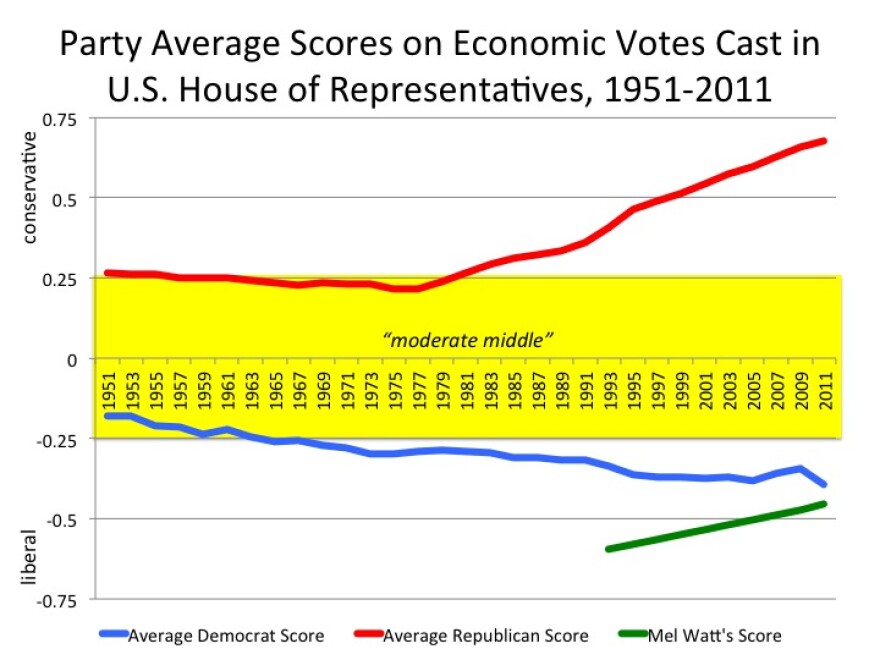My most recent post was entitled With Nomination in Hand, Foxx Faces GOP Delay Machine. While several cabinet nominees have faced delaying tactics by the minority GOP conference in the U.S. Senate for reasons perhaps other than the nominee’s qualifications, this week’s other Charlotte nominee may face not just delay, but a possible denial of his appointment.
We expect Republicans to express dismay and a “lack of enthusiasm” for Mel Watt. He’s a 20-year veteran of the U.S. House and one of the top five Democrats on the House Financial Services Committee. Liberals are enthusiastic about his nomination, in part for his strong support of cracking down on predatory loans and overhauling credit card regulations.
But do we have a sense as to “how liberal” Watt is, in comparison to other House Democrats? Through the use of a scoring mechanism developed by two political scientists, we can track the placement of Watt in terms of where he falls on economic issues, especially when voting on legislation that increases the role of government in economics.
For this scoring, each representative is compared to the other members in terms of casting votes on economic issues: Absolute conservatives (those who vote against any government involvement in the economy) would be closest to a score of 1.0, while absolute liberals (those voting for government involvement in the economy) would be closer to a score of -1.0.
With these scores, we can get a sense as to how both parties in the U.S. House have transformed into today’s polarized groups. Going back into what was seen as the “moderate 1950s,” both parties saw their average score within the “moderate range” (generally considered 0.25 to -0.25 on the vertical scale).

But starting in the late 1960s for Democrats and in the late 1970s for Republicans, the parties begin to move in opposite directions: Democrats’ average moved more liberal, while Republicans’ average moved more conservative (in fact, much more than Democrats moved liberal).
By the time Watt enters the House in 1993, both parties had moved well out of the moderate middle and an ideological polarization was in full effect.
In comparison to his Democratic colleagues in the U.S. House, Mel Watt saw his ranking change over his 20 years in the Democratic caucus. By the time he had served his first two years, Watt’s voting record placed him as the 12th-most liberal member of all House Democrats.
As both political parties continued their ideological shift, Watt’s “score” began to move slightly, but his “standing” within the Democratic Caucus was much more pronounced in its shift.
103rd Congress (1993-94): 12th most liberal
104th Congress (1995-96): 13th most liberal
105th Congress (1997-98): 18th most liberal
106th Congress (1999-2000): 20th most liberal
107th Congress (2001-02): 24th most liberal
108th Congress (2003-04): 29th most liberal
109th Congress (2005-06): 37th most liberal
110th Congress (2007-08): 43rd most liberal
111th Congress (2009-10): 54th most liberal
112th Congress (2011-12): 57th most liberal
In the last session with votes analyzed (the 112th Congress, from 2011-2013), Watt’s standing among his party colleagues had shifted to where he was now the 57th most liberal member within the Democratic Caucus.
So while Watt’s score moderated since his first vote cast, his party saw more and more liberal Democrats entering the caucus and shifting the average more toward Watt’s position.
Unlike Charlotte Mayor Anthony Foxx, who has a relatively short record of votes and policies, Rep. Watt has nearly two decades of votes cast that can give Republicans ample opportunities to pick the nominee apart.
So instead of delaying the nominee due to other “considerations,” the Senate Republicans may choose to grind Watt’s nomination to a standstill.


